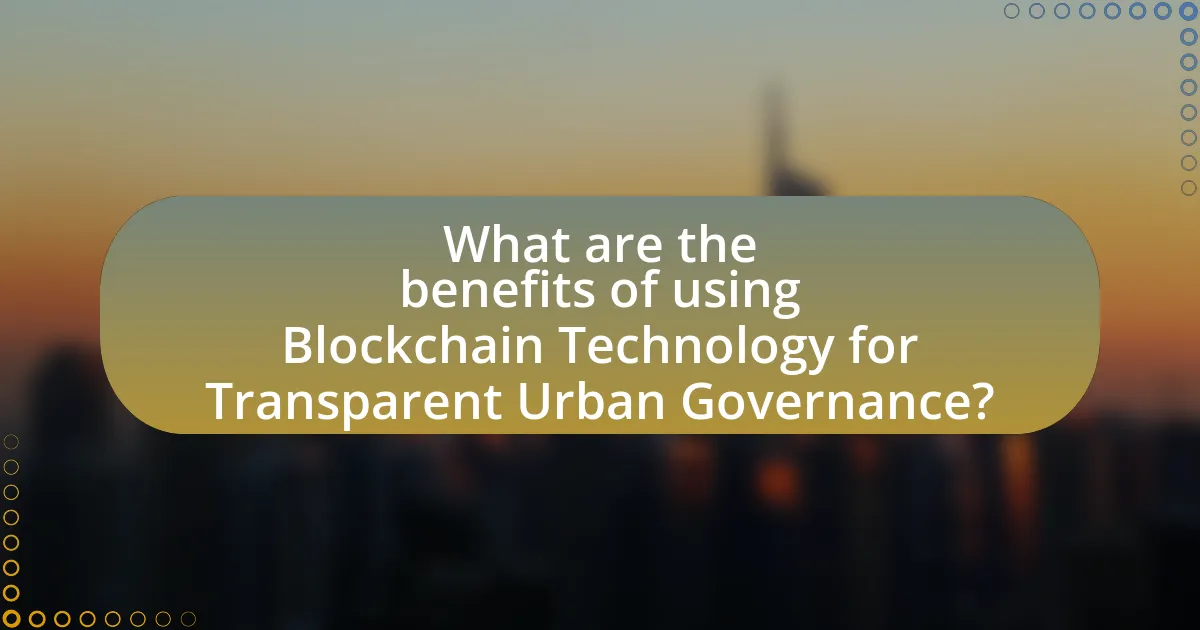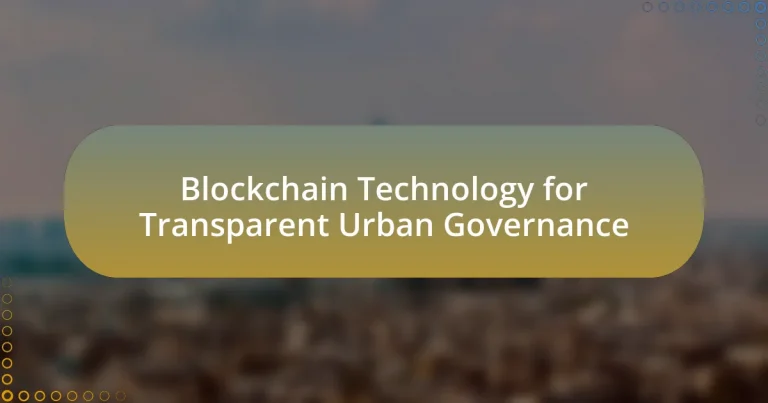Blockchain technology for transparent urban governance is a decentralized digital ledger system that enhances accountability and transparency in municipal operations. This technology allows cities to securely record and share data related to public services, transactions, and citizen engagement, thereby reducing corruption and fostering trust among citizens. Key features such as immutability, decentralization, and public accessibility contribute to increased transparency and accountability in urban governance. The article explores various applications of blockchain in urban settings, including land registration, public records management, and citizen engagement initiatives, while also addressing challenges such as scalability and regulatory issues. Additionally, it highlights the potential economic advantages and innovative solutions that blockchain can bring to urban governance, ultimately shaping the future landscape of city management.

What is Blockchain Technology for Transparent Urban Governance?
Blockchain technology for transparent urban governance is a decentralized digital ledger system that enhances accountability and transparency in municipal operations. By utilizing blockchain, cities can securely record and share data related to public services, transactions, and citizen engagement, ensuring that information is immutable and accessible to all stakeholders. For instance, cities like Dubai have implemented blockchain to streamline processes such as property registration and licensing, which reduces corruption and increases trust among citizens. This technology enables real-time tracking of public funds and resources, thereby fostering a more participatory governance model.
How does blockchain technology enhance transparency in urban governance?
Blockchain technology enhances transparency in urban governance by providing a decentralized and immutable ledger that records all transactions and activities. This transparency allows citizens to access real-time information about government actions, budgets, and resource allocations, thereby reducing opportunities for corruption and mismanagement. For instance, a study by the World Economic Forum highlights that blockchain can track public spending and ensure accountability, as every transaction is recorded and cannot be altered retroactively. This level of transparency fosters trust between citizens and government entities, ultimately leading to more effective governance.
What are the key features of blockchain that support transparency?
The key features of blockchain that support transparency include immutability, decentralization, and public accessibility. Immutability ensures that once data is recorded on the blockchain, it cannot be altered or deleted, providing a permanent and verifiable record of transactions. Decentralization distributes control across a network of nodes, reducing the risk of manipulation by a single entity and fostering trust among participants. Public accessibility allows anyone to view the blockchain’s contents, promoting accountability and enabling stakeholders to verify information independently. These features collectively enhance transparency in urban governance by ensuring that all transactions are traceable and auditable.
How does data immutability contribute to trust in urban governance?
Data immutability enhances trust in urban governance by ensuring that recorded information cannot be altered or deleted, thereby providing a reliable and transparent record of transactions and decisions. This characteristic of immutability, often associated with blockchain technology, allows stakeholders, including citizens and government officials, to verify the authenticity of data independently. For instance, when urban planning decisions are documented on an immutable ledger, it prevents manipulation or retrospective changes, fostering accountability. Studies have shown that cities implementing blockchain for governance, such as Dubai, have reported increased public trust due to the transparency and integrity of data management, reinforcing the notion that immutable data is crucial for building confidence in urban governance systems.
What are the potential applications of blockchain in urban governance?
Blockchain technology can enhance urban governance through applications such as transparent public records management, efficient land registration, and improved citizen engagement. By utilizing blockchain, municipalities can create immutable records of property ownership, reducing fraud and disputes in land transactions. For instance, countries like Sweden have implemented blockchain for land registry, resulting in faster transactions and increased trust among stakeholders. Additionally, blockchain can facilitate participatory budgeting, allowing citizens to vote on budget allocations securely and transparently, as seen in initiatives like the City of Paris’s participatory budget project. These applications demonstrate how blockchain can streamline processes, increase accountability, and foster greater public trust in urban governance.
How can blockchain improve public service delivery?
Blockchain can improve public service delivery by enhancing transparency, accountability, and efficiency in government operations. By utilizing a decentralized ledger, blockchain allows for real-time tracking of transactions and services, reducing the potential for fraud and corruption. For instance, a study by the World Economic Forum highlights that blockchain can streamline processes such as land registration and public procurement, leading to faster service delivery and reduced administrative costs. Additionally, the immutable nature of blockchain records ensures that all changes are traceable, fostering trust between citizens and government entities.
What role does blockchain play in citizen engagement and participation?
Blockchain enhances citizen engagement and participation by providing a transparent, secure, and immutable platform for interactions between citizens and government entities. This technology allows for real-time access to information, enabling citizens to track government activities, participate in decision-making processes, and hold officials accountable. For instance, initiatives like participatory budgeting have utilized blockchain to ensure that citizens can see how funds are allocated and spent, fostering trust and encouraging active involvement. Additionally, studies have shown that blockchain can reduce barriers to participation by simplifying processes such as voting and public consultations, thus increasing overall civic engagement.
What challenges does blockchain technology face in urban governance?
Blockchain technology faces several challenges in urban governance, including scalability, regulatory uncertainty, and integration with existing systems. Scalability issues arise as blockchain networks may struggle to handle the high volume of transactions typical in urban environments, potentially leading to delays and inefficiencies. Regulatory uncertainty is another significant challenge, as governments may lack clear frameworks for blockchain implementation, creating hesitance among stakeholders. Additionally, integrating blockchain with existing urban governance systems can be complex, requiring significant changes to infrastructure and processes. These challenges hinder the widespread adoption of blockchain technology in urban governance, impacting its potential to enhance transparency and efficiency.
What are the technical barriers to implementing blockchain in cities?
The technical barriers to implementing blockchain in cities include scalability issues, interoperability challenges, and high energy consumption. Scalability is a significant concern as many blockchain networks struggle to handle a large number of transactions simultaneously, which is essential for urban applications that require real-time data processing. Interoperability challenges arise because different blockchain systems may not communicate effectively with each other or with existing city infrastructure, hindering seamless integration. Additionally, the high energy consumption associated with certain blockchain protocols, particularly those using proof-of-work mechanisms, raises sustainability concerns, making it difficult for cities to adopt these technologies without increasing their carbon footprint.
How do regulatory issues impact the adoption of blockchain for governance?
Regulatory issues significantly hinder the adoption of blockchain for governance by creating uncertainty and compliance challenges for stakeholders. Governments often lack clear frameworks for blockchain technology, leading to hesitation among public institutions to implement it. For instance, the European Union’s General Data Protection Regulation (GDPR) poses challenges for blockchain’s immutability, as it conflicts with the right to be forgotten. Additionally, varying regulations across jurisdictions can complicate cross-border blockchain initiatives, deterring investment and innovation. These factors collectively contribute to a cautious approach towards integrating blockchain into governance systems.
How can cities effectively implement blockchain for governance?
Cities can effectively implement blockchain for governance by establishing a clear regulatory framework, engaging stakeholders, and utilizing pilot projects to demonstrate feasibility. A regulatory framework ensures compliance with existing laws and addresses concerns related to data privacy and security. Engaging stakeholders, including citizens, businesses, and government agencies, fosters collaboration and builds trust in the technology. Pilot projects, such as those implemented in cities like Dubai and Tallinn, showcase practical applications of blockchain in areas like land registration and voting, providing tangible evidence of its benefits. These initiatives have led to increased transparency, reduced fraud, and improved efficiency in public services, validating the effectiveness of blockchain in urban governance.
What best practices should cities follow when adopting blockchain technology?
Cities should prioritize stakeholder engagement and collaboration when adopting blockchain technology. Engaging citizens, businesses, and government entities ensures that the technology meets the needs of all parties involved. For instance, the city of Zug in Switzerland successfully implemented blockchain for its e-residency program by involving local stakeholders in the design process, resulting in increased trust and participation. Additionally, cities should focus on regulatory compliance and interoperability with existing systems to facilitate seamless integration. The European Union’s Blockchain Observatory and Forum emphasizes the importance of aligning blockchain initiatives with existing legal frameworks to avoid conflicts and enhance adoption. Lastly, cities must invest in education and training for both public officials and citizens to foster understanding and effective use of blockchain solutions, as demonstrated by initiatives in Estonia, where government training programs have led to successful digital governance implementations.
How can collaboration between stakeholders enhance blockchain implementation?
Collaboration between stakeholders enhances blockchain implementation by fostering shared goals, resources, and expertise, which leads to more effective and efficient deployment. When various stakeholders, such as government entities, private companies, and community organizations, work together, they can align their interests and create a unified vision for blockchain applications. This collaboration can result in the pooling of financial resources, technical knowledge, and regulatory insights, which are crucial for overcoming the challenges associated with blockchain technology. For instance, a study by the World Economic Forum highlights that multi-stakeholder partnerships can accelerate the development of blockchain solutions in urban governance by ensuring that diverse perspectives are considered, thus increasing the likelihood of successful implementation.

What are the benefits of using Blockchain Technology for Transparent Urban Governance?
Blockchain technology enhances transparent urban governance by providing immutable records, increasing accountability, and facilitating real-time data sharing. The decentralized nature of blockchain ensures that all transactions and decisions are recorded transparently, reducing the risk of corruption and fraud. For instance, cities like Dubai have implemented blockchain for land registries, which has led to a 100% reduction in fraud cases related to property transactions. Additionally, blockchain enables citizens to access information about government activities and expenditures in real-time, fostering trust and engagement. This transparency can lead to improved public services and more efficient resource allocation, as evidenced by pilot projects in various municipalities that have reported increased citizen satisfaction and participation.
How does blockchain improve accountability in urban governance?
Blockchain improves accountability in urban governance by providing a transparent and immutable ledger for recording transactions and decisions. This technology enables real-time tracking of public funds, contracts, and project outcomes, ensuring that all stakeholders can access the same information. For instance, a study by the World Economic Forum highlights that blockchain can reduce corruption by making it difficult to alter records without detection, thus fostering trust among citizens and government entities. Additionally, the decentralized nature of blockchain allows for greater citizen participation in governance processes, as individuals can verify and audit government actions independently.
What mechanisms ensure accountability through blockchain systems?
Blockchain systems ensure accountability through mechanisms such as immutability, transparency, and decentralized consensus. Immutability guarantees that once data is recorded on the blockchain, it cannot be altered or deleted, which prevents fraud and ensures that all transactions are permanent and verifiable. Transparency allows all participants in the network to view the same data, fostering trust among users as they can independently verify transactions. Decentralized consensus mechanisms, such as proof of work or proof of stake, require agreement from multiple nodes before a transaction is validated, reducing the risk of manipulation by any single entity. These features collectively enhance accountability by creating a secure and trustworthy environment for data management and transactions.
How can blockchain reduce corruption in urban management?
Blockchain can reduce corruption in urban management by providing a transparent and immutable ledger for transactions and data sharing. This technology enables real-time tracking of public funds, contracts, and project progress, which minimizes opportunities for fraudulent activities. For instance, a study by the World Economic Forum highlights that blockchain can enhance accountability in public procurement processes by ensuring that all transactions are recorded and accessible to stakeholders, thereby deterring corrupt practices. Additionally, the decentralized nature of blockchain reduces the risk of data manipulation by a single entity, further promoting integrity in urban governance.
What economic advantages does blockchain offer to urban governance?
Blockchain offers significant economic advantages to urban governance by enhancing transparency, reducing operational costs, and improving efficiency in public services. The decentralized nature of blockchain technology allows for secure and immutable record-keeping, which minimizes corruption and fraud in municipal transactions. For instance, a study by the World Economic Forum highlights that blockchain can reduce administrative costs by up to 30% through streamlined processes and reduced paperwork. Additionally, blockchain facilitates real-time data sharing among various government departments, leading to quicker decision-making and resource allocation. This improved efficiency can result in better public service delivery, ultimately fostering economic growth within urban areas.
How can blockchain reduce operational costs for city administrations?
Blockchain can reduce operational costs for city administrations by streamlining processes and enhancing transparency. By utilizing smart contracts, city administrations can automate various administrative tasks, such as permit approvals and payment processing, which reduces the need for manual intervention and minimizes errors. A study by the World Economic Forum indicates that blockchain can save governments up to $16 billion annually by improving efficiency and reducing fraud. Additionally, the decentralized nature of blockchain eliminates the need for intermediaries, further lowering transaction costs and expediting service delivery.
What impact does blockchain have on resource allocation in cities?
Blockchain significantly enhances resource allocation in cities by providing transparency, efficiency, and accountability in urban governance. This technology enables real-time tracking of resources, ensuring that funds and materials are allocated based on verified needs rather than assumptions. For instance, a study by the World Economic Forum highlights that blockchain can reduce administrative costs by up to 30% in public sector projects, allowing for more effective use of taxpayer money. Additionally, cities like Dubai are implementing blockchain to streamline processes in areas such as waste management and energy distribution, leading to optimized resource allocation and improved service delivery.
How does blockchain technology foster innovation in urban governance?
Blockchain technology fosters innovation in urban governance by enhancing transparency, accountability, and efficiency in public administration. This decentralized ledger system allows for secure and immutable record-keeping, which can streamline processes such as land registration, voting, and public service delivery. For instance, cities like Dubai are implementing blockchain for real estate transactions, reducing fraud and increasing trust among stakeholders. Additionally, blockchain facilitates citizen engagement through smart contracts, enabling residents to participate in decision-making processes directly. The World Economic Forum has noted that blockchain can significantly reduce bureaucratic inefficiencies, leading to faster service delivery and improved public trust in government institutions.
What innovative solutions can emerge from blockchain applications in cities?
Blockchain applications in cities can lead to innovative solutions such as enhanced transparency in governance, improved public service delivery, and efficient resource management. For instance, smart contracts can automate and streamline processes like property registration and permit issuance, reducing bureaucratic delays and corruption. Additionally, blockchain can facilitate secure and transparent voting systems, increasing citizen engagement and trust in local governance. A study by the World Economic Forum highlights that blockchain can improve urban planning by providing immutable records of land ownership and usage, thereby supporting sustainable development initiatives.
How can blockchain facilitate smart city initiatives?
Blockchain can facilitate smart city initiatives by providing a decentralized and transparent framework for data management and transactions. This technology enables secure sharing of information among various stakeholders, such as government agencies, businesses, and citizens, enhancing trust and accountability. For instance, blockchain can streamline processes like land registration, ensuring that property records are immutable and easily accessible, which reduces fraud and disputes. Additionally, smart contracts on blockchain can automate public services, such as waste management and energy distribution, leading to increased efficiency and reduced operational costs. The implementation of blockchain in smart cities has been supported by various pilot projects worldwide, demonstrating its potential to improve urban governance and service delivery.

What are the future prospects of Blockchain Technology in Urban Governance?
The future prospects of Blockchain Technology in Urban Governance include enhanced transparency, improved efficiency, and increased citizen engagement. Blockchain can provide immutable records of transactions and decisions, which can reduce corruption and increase trust in governmental processes. For instance, cities like Dubai are already implementing blockchain for land registries, which streamlines property transactions and reduces fraud. Additionally, smart contracts can automate processes such as permit approvals, significantly cutting down bureaucratic delays. Research from the World Economic Forum indicates that by 2025, 10% of global GDP could be stored on blockchain technology, highlighting its potential impact on urban governance systems.
How is the landscape of urban governance expected to change with blockchain?
The landscape of urban governance is expected to change significantly with the integration of blockchain technology by enhancing transparency, accountability, and efficiency in public administration. Blockchain’s decentralized ledger system allows for secure and immutable record-keeping, which can reduce corruption and increase trust among citizens. For instance, cities like Zug in Switzerland have already implemented blockchain for secure voting and public services, demonstrating its potential to streamline processes and improve citizen engagement. Additionally, the use of smart contracts can automate and enforce regulations, further optimizing urban management and resource allocation.
What trends are emerging in the integration of blockchain in urban systems?
Emerging trends in the integration of blockchain in urban systems include enhanced transparency in governance, improved data management, and increased citizen engagement. Cities are adopting blockchain to create immutable records of transactions and decisions, which fosters trust among residents. For instance, initiatives in cities like Dubai and Tallinn have demonstrated how blockchain can streamline public services and reduce bureaucratic inefficiencies. Additionally, the use of smart contracts is gaining traction, allowing for automated and transparent execution of agreements, which can optimize urban resource allocation. These trends are supported by research indicating that blockchain can significantly reduce corruption and increase accountability in urban governance.
How can cities prepare for the future of blockchain governance?
Cities can prepare for the future of blockchain governance by implementing pilot projects that test blockchain applications in public services. These pilot projects can demonstrate the technology’s potential for enhancing transparency, efficiency, and citizen engagement in governance. For instance, cities like Zug in Switzerland have already adopted blockchain for secure digital identities and voting systems, showcasing how blockchain can streamline administrative processes and increase public trust. Additionally, cities should invest in training local government officials and stakeholders on blockchain technology to ensure they understand its implications and capabilities. This proactive approach will enable cities to adapt to the evolving landscape of digital governance effectively.
What role do citizens play in the future of blockchain governance?
Citizens play a crucial role in the future of blockchain governance by participating in decision-making processes and ensuring transparency. Their involvement can enhance accountability and trust in governance systems, as blockchain technology allows for immutable records of transactions and decisions. For instance, citizen engagement in decentralized governance models can lead to more democratic participation, as seen in projects like DAO (Decentralized Autonomous Organizations), where stakeholders vote on proposals directly. This participatory approach can empower citizens to influence policies and resource allocation, ultimately fostering a more inclusive and responsive governance framework.
How can citizen feedback shape blockchain initiatives in urban governance?
Citizen feedback can significantly shape blockchain initiatives in urban governance by ensuring that the technology aligns with the needs and preferences of the community. When citizens provide input on governance issues, it can guide the development of blockchain applications that enhance transparency, accountability, and participation in decision-making processes. For instance, a study by the World Economic Forum highlights that incorporating citizen feedback in blockchain projects can lead to more effective public services and increased trust in government institutions. This feedback loop allows urban governance to adapt and evolve, ensuring that blockchain solutions are not only technologically sound but also socially relevant and accepted by the community.
What educational efforts are needed to empower citizens in blockchain governance?
Educational efforts needed to empower citizens in blockchain governance include comprehensive training programs that focus on blockchain technology, its applications, and governance structures. These programs should cover the fundamentals of blockchain, including its decentralized nature, smart contracts, and consensus mechanisms, enabling citizens to understand how these elements contribute to transparent governance.
Additionally, workshops and seminars should be organized to facilitate discussions on the implications of blockchain in urban governance, fostering critical thinking and engagement among citizens. Research indicates that informed citizens are more likely to participate in governance processes; for instance, a study by the World Economic Forum highlights that education in emerging technologies enhances civic engagement and trust in governance systems.
Furthermore, partnerships with educational institutions can help integrate blockchain education into existing curricula, ensuring that citizens are equipped with the necessary skills to navigate and influence blockchain governance effectively.
What practical steps can cities take to leverage blockchain technology?
Cities can leverage blockchain technology by implementing decentralized identity systems to enhance citizen engagement and streamline service delivery. By utilizing blockchain for identity verification, cities can ensure secure and transparent access to public services, reducing fraud and improving efficiency. For instance, the city of Zug in Switzerland has successfully implemented a blockchain-based identity system that allows residents to vote and access services securely. This practical step not only fosters trust in governance but also encourages greater participation from citizens in urban decision-making processes.
What pilot projects can cities initiate to test blockchain applications?
Cities can initiate pilot projects such as blockchain-based land registries, which enhance transparency and reduce fraud in property transactions. For instance, the city of Zug in Switzerland has implemented a blockchain land registry that allows for secure and immutable property records, demonstrating increased efficiency and trust in real estate dealings. Additionally, cities can explore blockchain applications for voting systems, as seen in initiatives like the Voatz platform, which has been used in various U.S. elections to ensure secure and verifiable voting processes. These projects provide concrete examples of how blockchain can improve urban governance by increasing transparency and accountability.
How can cities measure the success of blockchain implementations in governance?
Cities can measure the success of blockchain implementations in governance through key performance indicators (KPIs) such as transparency, efficiency, user satisfaction, and cost reduction. By assessing the level of transparency, cities can evaluate how accessible and understandable the blockchain data is to citizens, which can be quantified through surveys and public engagement metrics. Efficiency can be measured by analyzing the time taken to process transactions or services before and after blockchain implementation, with studies indicating that blockchain can reduce processing times by up to 50%. User satisfaction can be gauged through feedback mechanisms, where citizens report their experiences with blockchain-based services, and studies show that improved service delivery often leads to higher satisfaction rates. Lastly, cost reduction can be tracked by comparing operational costs pre- and post-implementation, with reports suggesting that blockchain can lower administrative costs by approximately 30% in various governance applications.


